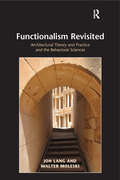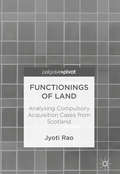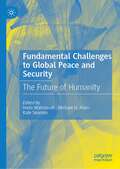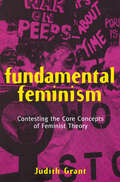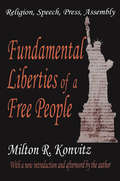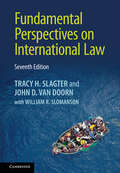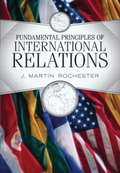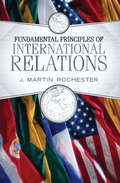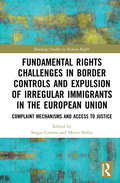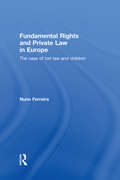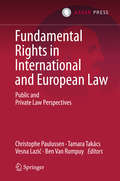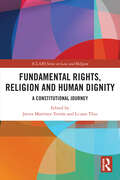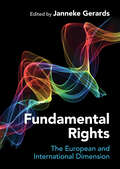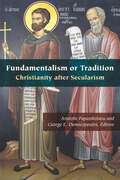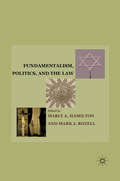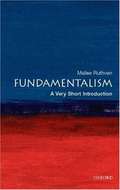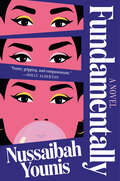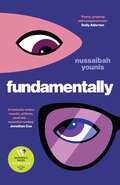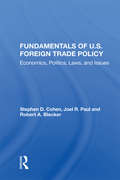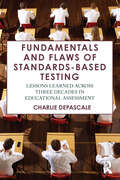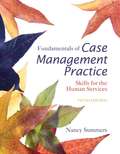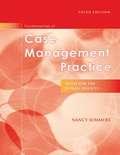- Table View
- List View
Functionalism Revisited: Architectural Theory and Practice and the Behavioral Sciences
by Jon Lang Walter MoleskiA range of current approaches to architecture are neglected in our contemporary writings on design philosophies. This book argues that the model of 'function' and the concept of a 'functional building' that we have inherited from the twentieth-century Modernists is limited in scope and detracts from a full understanding of the purposes served by the built environment. It simply does not cover the range of functions that buildings can afford nor is it tied in a conceptually clear manner to our contemporary concepts of architectural theory. Based on Abraham Maslow's theory of human motivations, and following on from Lang's widely-used text, Creating Architectural Theory: The Role of the Behavioral Sciences in Environmental Design, Lang and Moleski here propose a new model of functionalism that responds to numerous observations on the inadequacy of current ways of thinking about functionalism in architecture and urban design. Copiously illustrated, the book puts forward this model and then goes on to discuss in detail each function of buildings and urban environments.
Functionings of Land: Analysing Compulsory Acquisition Cases from Scotland
by Jyoti RaoThis book focuses on the 'functionings' and capabilities generated from land by their owners and the challenge in satisfactorily recreating these through the compensation paid in the case of compulsory acquisition of private land. These discussions initiate a new debate on the insufficiency of existing approaches to compensation that are ignorant of the losses of ‘capabilities’ and ‘functionings’. The relationship between land, ownership and well-being of an individual is explained through the identification of various ‘functionings’ associated with the ownership of land in the context of Scotland. Contemporary approaches to compensation, founded on the utilitarian argument, have led to dissatisfactory outcomes for the affected landowners. Discussions in this book shift the focus to equalizing the share of burdens and benefits for each individual member of the society, through equalization of human capabilities. This book will be of value to development economists, researchers, policy makers and law makers concerned with compulsory acquisition of land.
Fund Supported Programs, Fiscal Policy, and Income Distribution
by International Monetary FundThis is the third in a group of three papers dealing with various aspects of Fund-supported adjustment programs.
Fund-Supported Adjustment Programs and Economic Growth
by Mohsin S. Khan Malcolm D. KnightA report from the International Monetary Fund.
Fundamental British Values, Michel Foucault, and Religious Education Teacher Subjectivity: A Critical Investigation
by Francis FarrellThis book contributes to the small but growing critical literature on fundamental British values and the Prevent strategy in the British education system. Focusing specifically on RE, a subject concerned with multiculturalism, difference and pluralism, the book will argue that there is a tension between the aims of RE and the agenda of fundamental British values. The author argues that fundamental British values and the requirements of the Prevent duty (2015) amount to a securitization of education which fundamentally alters the relationship between teachers and learners. The book presents these developments in education policy as a radical discursive shift: drawing from in depth individual and group interviews with 52 secondary teachers of religious education, the book foregrounds the views of BAME teachers and argues for a nuanced and inclusive approach to civic and values education.
Fundamental Challenges to Global Peace and Security: The Future of Humanity
by Hoda Mahmoudi Kate Seaman Michael H. AllenThis book challenges the current thinking and strategies in the field of global peace and security. It is clear that current global public and private institutions are inadequate for the challenges we face today. These challenges cut across borders and require a more coordinated and concerted effort to find workable solutions. This book therefore begins with the question of global leadership and works its way back to the interconnected dynamics of global modernity and conflict. It is divided into four parts, each addressing a fundamental challenge to global peace and security. By exploring how we break out of the current framework, in which we understand global activities and the distribution of resources, and this book provides new ways of understanding the material, cultural, political, and spiritual relations that form the basis of international society.
Fundamental Feminism: Contesting the Core Concepts of Feminist Theory
by Judith GrantIn Fundamental Feminism, Judith Grant explores the evolution of feminist theory as well as the state of today's feminist thought. Pointing to the main problems within feminism, Grant calls for a substantial revision of the core concepts responsible for shaping today's feminist theory. Grant identifies and critiques three core concepts in feminist theory--"woman," "experience," and "personal politics"--from their origins in pamphlets and writings in the early women's liberation movement to their current construction in feminist thought. She connects a number of key debates in feminism today to the longstanding influence of these core assumptions. These debates include the hegemony of the white female perspective, the tension between anti-pornography and pro-sex feminists, and the challenges presented by postmodernism. Fundamental Feminism is provocative reading for anyone interested in the future of feminist theory and the power of feminist politics.
Fundamental Liberties of a Free People: Religion, Speech, Press, Assembly (Cornell Studies In Civil Liberty)
by Milton KonvitzOf the American Bill of Rights, perhaps the forty-five words that comprise the First Amendment-allowing freedom of religion, speech, press, and assembly, and the guaranty of the writ of habeas corpus-are the most precious. Only a legal expert could lay claim to truly understanding the meaning and intention of those basic freedoms. Yet it is precisely the expert, knowing the complexity of the subject, who would be the first to hesitate to claim to possess such a thorough understanding. In analyzing such freedoms basic to American society, Milton Konvitz helps make comprehending our fundamental liberties easier. The book is divided into three parts: I. Freedom of Religion; II. Freedom of Speech, Press, and Assembly; III. Freedom of Speech, Press, and Assembly: The Clear and Present Danger Doctrine. The reader will find included such topics as the debate over the scope of the separation of Church and State, whether or not freedom of religion is an absolute right, religious freedom prior to 1776, the liberty of private schools, heresy, the right for a religious group to seek converts, the freedoms not to speak and listen, obscene literature, picketing in labor disputes, the freedom to think and believe, abridgments of speech and press, and loyalty oaths and guilt by association. Konvitz's work includes an important chapter on the history of the adoption of the Bill of Rights. His careful tracing of the development of constitutional attitudes to the freedoms protected by the First Amendment is a scholarly benchmark, and is still an archetype for students doing research and writing about these issues. It is of critical importance to anyone seeking an authoritative statement on the basic liberties guaranteed by the First Amendment to the United States Constitution.Fundamental Liberties of a Free People is a relevant and practical guide to understanding the liberties so fundamental to a free society. In his new introduction and afterword, author Milton Konvitz brings First Amendment developments up to 2002. It will be welcomed by students and scholars of constitutional law, government, politics, religion, and American history.
Fundamental Perspectives on International Law
by Tracy H. Slagter John D. Van DoornHow does international law impact the behavior of states? This book designed for students in multiple disciplines offers a comprehensive, accessible introduction to the 'law of nations,' detailing the evolution of state practice in response to an ever-changing, diverse world. In this new edition of William Slomanson's foundational text, the new authors, Professors Slagter and Van Doorn, trace how states manage their sovereignty in myriad ways, working through treaties, international organizations, and international courts to secure their own as well as global interests. With special emphasis on five key areas-human rights, the use of force, human security and humanitarian intervention, environmental protection, and economic relations-the authors illustrate both the power and limits of international law to provide structure and predictability on a globalized planet. Real-world problem sets, annotated bibliographies, and a practical guide to studying international law make this a text that students and instructors alike will appreciate.
Fundamental Principles of International Relations
by J. Martin RochesterThis book distills the essential elements of world politics, both the enduring characteristics as well as the revolutionary changes that may be altering the very fabric of the centuries-old state system. Author J. Martin Rochester explores all the important topics that one would expect to find in an IR text (war, diplomacy, foreign policy, international law and organization, the international economy, and more) but injects fresh perspectives on how globalization and other contemporary trends are affecting these issues. In addition, the author does so through a highly engaging, lively writing style that will appeal to today's students. Fundamental Principles of International Relations is a tightly woven treatment of international politics past and present, drawing on the latest academic scholarship while avoiding excessive jargon and utilizing pedagogical aids while avoiding clutter. Rochester ultimately challenges the reader to think critically about the future of a post-Cold War and post-9/11 world that is arguably more complex, if not more dangerous, than some previous eras, with the potential for promise as well as peril.
Fundamental Principles of International Relations
by J. Martin RochesterThis book distills the essential elements of world politics, both the enduring characteristics as well as the revolutionary changes that may be altering the very fabric of the centuries-old state system. Author J. Martin Rochester explores all the important topics that one would expect to find in an IR text (war, diplomacy, foreign policy, international law and organization, the international economy, and more) but injects fresh perspectives on how globalization and other contemporary trends are affecting these issues. In addition, the author does so through a highly engaging, lively writing style that will appeal to today's students. Fundamental Principles of International Relations is a tightly woven treatment of international politics past and present, drawing on the latest academic scholarship while avoiding excessive jargon and utilizing pedagogical aids while avoiding clutter. Rochester ultimately challenges the reader to think critically about the future of a post-Cold War and post-9/11 world that is arguably more complex, if not more dangerous, than some previous eras, with the potential for promise as well as peril.
Fundamental Rights Challenges in Border Controls and Expulsion of Irregular Immigrants in the European Union: Complaint Mechanisms and Access to Justice (Routledge Studies in Human Rights)
by Sergio Carrera Marco StefanThis edited volume examines the extent to which the various authorities and actors currently performing border management and expulsion-related tasks are subject to accountability mechanisms capable of delivering effective remedies and justice for abuses suffered by migrants and asylum seekers. Member states of the European Union and State Parties to the Council of Europe are under the obligation to establish complaint mechanisms allowing immigrants and/or asylum seekers to seek effective remedies in cases where their rights are violated. This book sheds light on the complaint bodies and procedures existing and available in Austria, Greece, Hungary, Italy, Spain, Poland, and Romania. It assesses their role in overseeing, investigating, and redressing cases of human rights violations deriving from violent border and immigration management practices, and expedited expulsion procedures. This book therefore provides an assessment of the practical, legal, and procedural challenges that affect the possibility to lodge complaints and access remedies for human rights violations suffered at the hands of the law enforcement authorities and other security actors operating at land, air, and sea borders, or participating in expulsions procedures – in particular, joint return flights. The volume will be of key interest to students, scholars, and practitioners working on human rights, migration and borders, international law, European law and security studies, EU politics, and more broadly, international relations.
Fundamental Rights and Private Law in Europe: The Case of Tort Law and Children
by Nuno FerreiraThe book explores, from a comparative and inter-disciplinary perspective, the relationship between fundamental rights and private law in Europe, a debate usually referred to as Drittwirkung or ‘horizontal effect of fundamental rights’. It discusses the different models of ‘horizontal effect’ and the impact that fundamental rights may have in shaping tort law, especially the position of child tortfeasors. The book concentrates on several European jurisdictions, namely France, Italy, Germany, Portugal, Sweden, Finland, and England and Wales. At a crossroad between human rights and European private law, this study draws insights from several legal fields (international, European, tort, constitutional and child law), sociology, psychology, and feminist studies. It also considers policy implications and advances proposals which would ensure the optimisation of the effect, and maximisation of the effectiveness, of fundamental rights in tort law, and more generally in private law. This book departs from traditional legal doctrines and offers a more pragmatic, comprehensive and just legal analysis of the role of fundamental rights in private law. It will be of interest to undergraduate and postgraduate students, academics, practitioners, policy-makers and activists with an interest in human rights, tort law, comparative law, children’s rights and European private law.
Fundamental Rights in International and European Law
by Christophe Paulussen Tamara Takács Vesna Lazić Ben Van RompuyIn this book various perspectives on fundamental rights in the fields of public and private international law are innovatively covered. Published on the occasion of the 50th anniversary of the T. M. C. Asser Instituut in The Hague, the collection reflects the breadth and scope of the Institute's research activities in the fields of public international law, EU law, private international law and international and European sports law. It does so by shedding more light on topical issues - such as drone warfare, the fight against terrorism, the international trade environment nexus and forced arbitration - that can be related to the theme of fundamental rights, which runs through all these four areas of research. Points of divergence and areas of common ground are uncovered in contributions from both staff members and distinguished external authors, having long-standing academic relations with the Institute. The Editors of this book are all staff members of the T. M. C. Asser Instituut, each of them representing one of the areas of research the Institute covers.
Fundamental Rights, Religion and Human Dignity: A Constitutional Journey (ICLARS Series on Law and Religion)
by Javier Martínez-Torrón and Li-ann ThioThis collection examines theoretical and practical issues concerning the relationship between freedom of religion or belief and other fundamental rights, in the context of secular States, from the perspective of human dignity.As the Universal Declaration of Human Rights made clear, human dignity constitutes the foundation of human rights, among which freedom of thought, conscience, and religion occupies a prominent place. As a consequence of the inter-cultural debate that is ongoing in contemporary Western societies, which are increasingly pluralistic, the concept of human dignity faces important challenges in terms of what it requires. The five chapters included in the first part of this book discuss some of these conceptual challenges, such as the implications of common good constitutionalism for the understanding of human dignity and the role of religious freedom from the perspective of Western experiences and legal thinkers. The chapters in Part II explore particular questions involving human dignity and the relationship between freedom of religion or belief and other human rights, for example, how to build bridges between religious freedom and other fundamental freedoms when people make conflicting legitimate choices. Taken together, the book offers an insightful range of perspectives on some contemporary challenges raised by the exercise of religious freedom in societies that claim to be based on respect for human dignity and human rights.The volume will be a valuable resource for academics, researchers, and policy-makers working in the areas of Law and Religion, Human Rights Law, Constitutional Law, and International Relations.
Fundamentalism or Tradition: Christianity after Secularism (Orthodox Christianity and Contemporary Thought)
by Aristotle Papanikolaou and George E. DemacopoulosTraditional, secular, and fundamentalist—all three categories are contested, yet in their contestation they shape our sensibilities and are mutually implicated, the one with the others. This interplay brings to the foreground more than ever the question of what it means to think and live as Tradition. The Orthodox theologians of the twentieth century, in particular, have emphasized Tradition not as a dead letter but as a living presence of the Holy Spirit. But how can we discern Tradition as living discernment from fundamentalism? What does it mean to live in Tradition when surrounded by something like the “secular”? These essays interrogate these mutual implications, beginning from the understanding that whatever secular or fundamentalist may mean, they are not Tradition, which is historical, particularistic, in motion, ambiguous and pluralistic, but simultaneously not relativistic.Contributors: R. Scott Appleby, Nikolaos Asproulis, Brandon Gallaher, Paul J. Griffiths, Vigen Guroian, Dellas Oliver Herbel, Edith M. Humphrey, Slavica Jakelić, Nadieszda Kizenko, Wendy Mayer, Brenna Moore, Graham Ward, Darlene Fozard Weaver
Fundamentalism, Politics, and the Law
by Marci A. Hamilton Mark J. RozellThis book studies the phenomenon of fundamentalism in the United States. It contains historical and contemporary scholarly analysis of the Christian movements that emerged around the time of the Moral Majority.
Fundamentalism: A Very Short Introduction
by Malise RuthvenFundamentalism is seen as the major threat to world peace today, a conclusion impossible to ignore since the events in New York on September 11, 2001. But what does "fundamentalism" really mean? Since it was coined by American Protestant evangelicals in the 1920s, the use of the term "fundamentalist" has expanded to include a diverse range of radical conservatives and ideological purists, not all religious. Fundamentalism could now mean both militant Israeli settlers as well as the Islamist radicals who oppose them, it can mean Christians, Hindus, animal liberationists, and even Buddhist nationalists. Here, Middle East expert Malise Ruthven investigates fundamentalism's historical, social, religious, political, and ideological roots, and tackles the polemic and stereotypes surrounding this complex phenomena--one that eludes simple definition, yet urgently needs to be understood.
Fundamentally: A Novel
by Nussaibah YounisA wickedly funny and audacious debut novel following an academic who flees from heartbreak and lands in Iraq with a one-of-a-kind job offer—only to be forced to do the work of confronting herself.When Dr. Nadia Amin, a long-suffering academic, publishes an article on the possibility of rehabilitating ISIS brides, the United Nations comes calling, offering an opportunity to lead a deradicalization program for the ISIS-affiliated women held in Iraqi refugee camps. Looking for a way out of London after a painful, unexpected breakup, Nadia leaps at the chance.In Iraq, Nadia quickly realizes she&’s in over her head. Her direct reports are hostile and unenthused about taking orders from an obvious UN novice, and the murmurs of deradicalization being inherently unethical and possibly illegal threaten to end Nadia&’s UN career before it even begins.Frustrated by her situation and the unrelenting heat, Nadia decides to visit the camp with her sullen team, composed of Goody Two-shoes Sherri who never passes up an opportunity to remind Nadia of her objections; and Pierre, a snippy Frenchman who has no qualms about perpetually scrolling through Grindr.At the camp, Nadia meets Sara, one of the younger refugees, whose accent immediately gives her away as a fellow East Londoner. From their first interaction, Nadia feels inexplicably drawn to the rude girl in the diamanté headscarf. She leaves the camp determined to get Sara home.But the system Nadia finds herself trapped in is a quagmire of inaction and corruption. One accomplishment barely makes a dent in Nadia&’s ultimate goal of freeing Sara . . . and the other women, too, of course. And so, Nadia makes an impossible decision leading to ramifications she could have never imagined.A triumph of dark humor, Fundamentally asks bold questions: Who can tell someone what to believe? And how do you save someone who doesn&’t want to be saved?
Fundamentally: ‘The debut of the year’ Stylist
by Nussaibah Younis'By normal, you mean like you? A slag with a saviour complex?' Nadia is an academic who's been disowned by her puritanical mother and dumped by her lover, Rosy. She decides to make a getaway, accepting a UN job in Iraq. Tasked with rehabilitating ISIS women, Nadia becomes mired in the opaque world of international aid, surrounded by bumbling colleagues. Sara is a precocious and sweary East Londoner who joined ISIS at just fifteen. Nadia is struck by how similar they are: both feisty and opinionated, from a Muslim background, with a shared love of Dairy Milk and rude pick-up lines. A powerful friendship forms between the two women, until a secret confession from Sara threatens everything Nadia has been working for. A bitingly original, wildly funny and razor-sharp exploration of love, family, religion and the decisions we make in pursuit of belonging, Fundamentally upends and explores a defining controversy of our age with heart, complexity and humour.
Fundamentals Of U.s. Foreign Trade Policy: Economics, Politics, Laws, And Issues
by Stephen D. CohenThis unique text integrates for the first time the three critical aspects of U.S. foreign trade policy formulation and implementation: economics, politics, and laws. In a comprehensive and nonjudgmental manner, a political scientist, an economist, and a legal scholar combine efforts to present a well-rounded view of the nature and impact of trade p
Fundamentals and Flaws of Standards-Based Testing: Lessons Learned Across Three Decades in Educational Assessment
by Charlie DePascaleWhen put to the test, will standards-based reporting remain as “fundamentally flawed” as once feared, or can next-generation approaches refine the system for the better? Fundamentals and Flaws of Standards-Based Testing offers an inside perspective on the technical challenges encountered during each phase of the assessment cycle. Careers in state testing are spent balancing technical, logistical, financial, political, psychological, sociocultural, emotional, and measurement considerations while keeping an eye on the educational goals of the state assessment program. This insightful and comprehensive book draws on measurement foundations and real-life experiences in state testing to discuss critical and still unresolved technical and policy challenges that are being inherited by today’s assessment specialists and psychometricians.Going beyond core descriptions of psychometric and assessment development procedures and operational best practices in testing, this book exposes graduate students and scholars of educational measurement and policy as well as testing industry professionals to real-life pressures faced by those charged with designing, implementing, and maintaining a large-scale state assessment program. Standard-setting, test design, score reporting, validation, and more are approached critically and with authentic context.
Fundamentals of Case Management Practice: Skills for the Human Services
by Nancy SummersThis book/workbook is a step-by-step guide through the case management process, from intake and assessment to referrals and termination. The fifth edition focuses on what is most important for readers to consider, document, and pass along in each step of the human services process. Chapters walk readers through each step of the case management process, while realistic exercises drawn from active professionals expose readers to a broad range of true-to-life circumstances and difficulties.
Fundamentals of Case Management Practice: Skills for the Human Services (3rd Edition)
by Nancy SummersSummers (Harrisburg Area Community College) walks through the case management process, and offers advice on meeting clients, recording initial inquiries, using the DSM IV, developing a service plan, monitoring service or treatment, and effectively documenting the process. The workbook format provides exercises for developing practical skills, and sample social service forms on perforated pages. The second edition adds a chapter on social histories and assessment forms.
